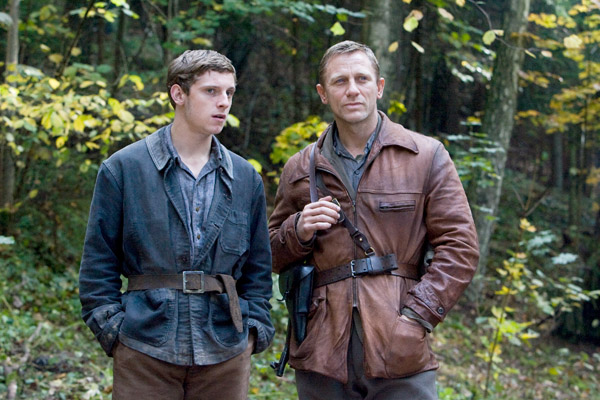|
Reviews of Recent Independent, Foreign, & Documentary Films in Theaters and DVD/Home Video

DEFIANCE
Just when it seems that 60 years of movies (plus the History Channel) have exhaustively covered every minute of World War II, films are still revealing more about the soldiers behind the official stories—North Africans in Rachid Bouchareb’s Days Of Glory, African Americans in Spike Lee’s Miracle at St. Anna, and Poles in Andrzej Wajda’s upcoming Katyn. Defiance, for the first time, portrays the story of tough Jewish resistance fighters on the Russian front taking guerrilla actions against the Nazis. And more. Under the leadership of the charismatic Bielski brothers, they were the only partisans hiding deep in the forests of Belarus to save Jews. From 1941 on, they actively sought out, rescued, and protected over a thousand Jewish men and women, young and old, from an endless onslaught of round-ups, ghetto liquidation, marauding collaborators, and attacks. When the rough-hewn Bielski brothers—the eldest, Tuvia (Daniel Craig), Zus (Liev Schreiber), and Asael (Jamie Bell) —witness the Nazi murder machine crushing their family and friends in all directions, they escape into the forest they know well. (There are vague references to their extra-legal expertise in evading border authorities and negotiating with outsiders.) They take in other Jews, whether or not they have weapons or skills, as more and more shell shocked stragglers follow the rumors of a Jerusalem in the forest. If this wasn’t adapted from a true story, Defiance would seem like a post-apocalyptic nightmare. Just staying alive is a victory, but a new society is forged under endless, horrendous pressures. Constantly on the run, the organized community is hounded on all sides by enemies and the weather, as well as lacking food, medicine, and supplies, and beset by personality, political, and tactical clashes. How they managed to survive against all these odds is fascinating. With an overly schematic emphasis, Tuvia is the king, settling the squabbles by fiat (he’s compared to Moses several times). Zus is the warrior who spends a lot of film time fighting alongside a Soviet commander, until he’s disgusted by the officer’s anti-Semitism. Young Asael is the maturing humanist. But the actors make this fraught fraternal triangle emotionally dynamic. With scenes of retribution and vengeance, some of the brutality has been toned down and the complexity of relationships overly simplified for sentimentality. The story is so powerful that director Edward Zwick’s old-fashioned flourishes are unnecessary to have these extraordinary circumstances inspire contemporary audiences. Yes, Craig forcefully embodies the conflicted Tuvia, who rules his forest domain on a horse wearing the best leather jacket the backwoods tannery could make. But it’s already understandable that the women would be falling all over him without having him ride in on a white steed out of the mist to James Newton Howard’s stirring score. For all the thrilling action, people too often talk in speeches, and Zwick and Clayton Frohman’s repetitive script makes the moral and ethical issues too obvious. The argumentative resident intellectuals (Mark Feuerstein and Allan Corduner as Tuvia’s formerly disapproving teacher) seem to be debating in a commune from King Vidor’s Our Daily Bread rather than in their upside-down world where really the only useful educated people were doctors. Zwick also makes unconventional dialect choices compared to other Hollywood Holocaust films. The multilingual Bielskis realistically speak German to the Nazis, Polish and Belarusian to the Christian peasants, and Russian with the Soviet partisans. But none of the Jews’ native Yiddish is heard. They speak English amongst themselves with a somewhat Russian accent, and not even with a Yiddish inflection or words to indicate their culture from all the antagonistic outsiders. I first
heard of these forest partisans many years ago when a quiet, elderly
member of our synagogue got up at a Holocaust commemoration to tell us
of his days as one of these fighters. Despite Zwick’s usual penchant for
the obvious over the subtle, the film vividly brings his and comrades’
stories to life. I would especially recommend this film to my cute blond
blue-eyed lab partner who argued with me all through junior high biology
class that Jews were only passive victims during the Holocaust.
Nora Lee Mandel
|

